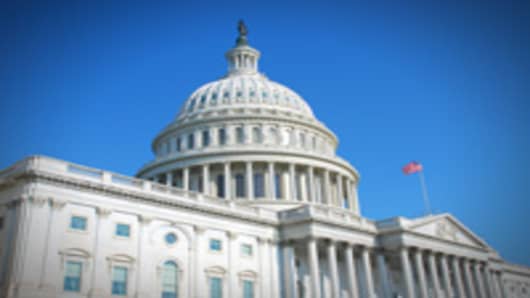A bill passed in the US Senate on Tuesday attempting to make it easier for the United States to impose tariffs on goods from countries which are believed to undervalue their currencies is unlikely to be signed into law by President Obama or supported by Republicans in the House of Representatives, Frank Lavin, Chairman at Edelman Asia Pacific and former Under Secretary of Commerce for International Trade told CNBC.
Lavin claimed that China was being blamed for economic woes of the US which is struggling to cope with a sluggish economy, rising unemployment and a vast deficit. He added that China, now the world's second largest economy, had essentially replaced Japan as the scapegoat for troubles within the US economy.
Lavin said that despite legitimate grievances over the undervaluing of the Chinese Yuan, punitive import tariffs would spark a "trade war" and exacerbate already volatile equity markets.
"There's genuine unhappiness (in the US), the issue is a real issue, but I think most people realize the cure is worse than the disease, meaning if you pass this you're not just going to get a trade war, you're going to see a 200 point drop in the Dow ."
US Problems 'Self Inflicted'
Lavin described the Currency Exchange Rate Oversight Reform Act as "a crude tool" and said it would do little to fix fundamental, "self inflicted" economic problems and distract US decision makers from reducing the deficit, creating jobs and stimulating growth.
"It's not going to deal with the US housing bubble, it's not going to help business confidence, it's not going to deal with the structural deficit we have in the US… these fundamental problems that are slowing down US economic growth aren't because of cheap Chinese imports," he explained.
"The problems in the US are overwhelmingly self inflicted problems with budgetary mismanagement and structural problems with some of the spending programs, no doubt about it," Lavin added.
Lavin claimed that Chinese attempts to appreciate its currency were unlikely to satisfy supporters of the bill for as long as the US economy faltered, and China in overtaking Japan as the world's second largest economy had also inherited the role of scapegoat for domestic economic issues.
"The proponent of this bill, Senator Schumer from New York said when he introduced this several years ago that China should move 20 percent and China has moved 25 percent, so I think China - to defend the Beijing point of view for a second - I think China's in a tough position that even if they move another 5 or 10 percent, it's not going to make people here happy because the US economy is going to be soft for the near term regardless," he said.
"For better or worse China is assuming a position in the public mind in the United States that is very political, it's a focal point now of all of this unhappiness, this anxiety is projected against China. It is the second largest economy in the world, it is a major US trading partner and so it's going to be the country you love to hate," he added.


